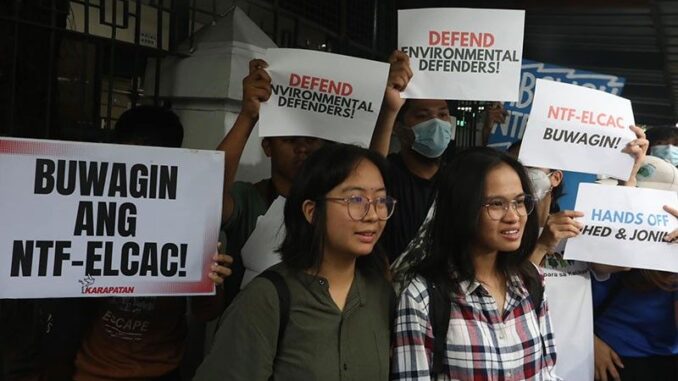
MANILA, Philippines — The Court of Appeals has denied the appeal of abducted environmental activists Jhed Tamano and Jonila Castro concerning their application for the writ of amparo and habeas data.
In a nine-page resolution promulgated on October 29, the Court of Appeals’ former Special Eighth Division (Division of Five) denied the motion for reconsideration filed by Castro and Tamano, citing a “lack of merit.”
The appellate court stated that the evidence presented to establish the pair’s entitlement to the writ of amparo was “largely speculative.”
“Petitioners’ arguments are largely speculative. Contrary to their argument, it would take more than a smooth transition to hold respondents accountable and responsible for their abduction,” the decision read.
Tamano and Castro argued in their appeal that the government failed to exercise extraordinary diligence in its duty to protect them.
However, the Court of Appeals reiterated that the transition of custody was insufficient to indicate government complicity:
“This is the case even though those responsible for petitioners’ abduction smoothly turned over physical custody to the 70th Infantry Battalion without any glitches or questions asked. Petitioners’ testimonies were clear and supported by the case record: from the abductors, they were turned over to the military on September 12, 2023, in a very seamless manner.”
The court further noted, “We are not unaware of the transition on September 12, 2023, when the abductors’ custody over petitioners ended, and they arrived at the military camp of the 70th Infantry Battalion. Again, this transition was not sufficiently shown to be indicative of government complicity. At most, the respondents’ role was to receive information that petitioners intended to surrender and to fetch them at the rendezvous, taking them in while their supposed surrender was processed.”
The court also held that the pair is not entitled to the privilege of the writ of habeas data.
“The requirement of data description is not an empty formality nor an unnecessary verbiage that can easily be dispensed with when convenient; as discussed in the decision, it was meant to prevent the use of the writ of habeas data precisely for situations such as this,” the decision stated.
What are those writs?
The writ of amparo is a legal remedy designed to protect individuals whose rights to life, liberty or security are threatened. It is commonly used in cases of extrajudicial killings and forced disappearances, providing a safeguard for citizens when other protective measures are inadequate.
The writ of habeas data, on the other hand, allows individuals to request access to any personal information collected about them by authorities. It can be used to correct or delete data if it’s deemed false or unlawfully gathered, particularly in cases involving privacy and security concerns.
What went before
In February 2024, the Supreme Court granted Tamano and Castro writs of amparo and habeas data and remanded the case to the Court of Appeals.
The pair’s appeal followed the appellate court’s initial denial of the protective writs despite the court recognizing their abduction as “credible, straightforward, and worthy of belief.”
In September 2023, the National Task Force to End Local Communist Armed Conflict asserted that Tamano and Castro voluntarily surrendered to the 70th Infantry Battalion in Doña Remedios Trinidad, Bulacan, following their abduction in Bataan on September 2.
The task force presented the two activists at a press conference to counter reports of their alleged abduction. However, the activists maintained that they were forcibly taken by the military.
Philstar.com has reached out to the activists’ lawyer, Dino de Leon, for comment but has yet to receive a reply.





Be the first to comment